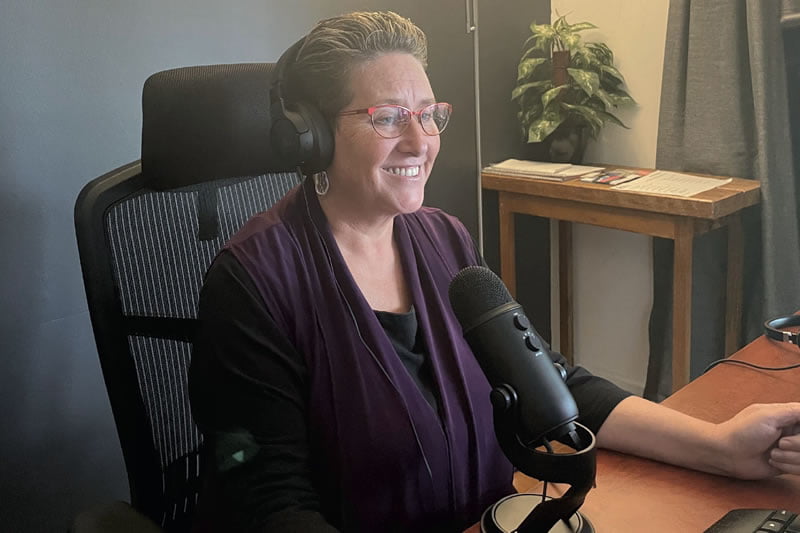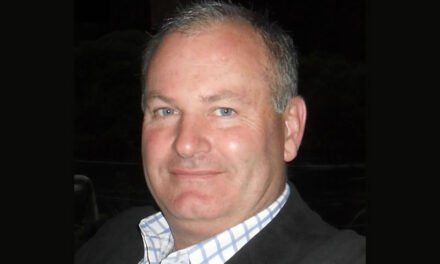FTMA Australia’s new podcast and report make it easier than ever to get the news you need.
Like most of us, Kersten Gentle isn’t a fan of 2022. “I told a friend the other day, if I see four horsemen riding down the street, I’m out of here!” says Gentle, executive officer of the Frame & Truss Manufacturers Association of Australia.
Managing the interests of an industry juggling supply chain issues, unprecedented demand, a global pandemic and now floods while still recovering from the Black Summer fires requires a hell of a ring master and a good set of acts. Recently, Gentle has added two to FTMA’s lineup.
Trussted Insight
The first is a new report, Trussted Insight, commissioned by FTMA with guest specialists every second month and regular reports in the alternating months from Tim Woods, managing director of IndustryEdge.
Throughout the pandemic, FTMA has asked Woods to write timber and housing updates which the Association has made available to everyone in the industry. The new publication expands on this brief and provides more detailed analysis with useful takeaways for members.
The first issue came out in February, titled Price is not the enemy: it’s an unprofitable supply chain that’s out to kill us!
Using language as straightforward as the title, the paper outlines why the current issues with rapidly climbing timber prices are far from being a problem. Instead, they represent an opportunity for us to reset the supply chain so that timber products aren’t always having their margins squeezed by people making real money elsewhere in construction. As Woods writes:
“Ultimately, the final price paid by the end consumer represents the total value that can be shared throughout the supply chain. The price you receive represents the total value that can be shared in the supply chain, up to and including your business.
“If that final price is inadequate to meet the income needs of the entire supply chain, one or more businesses in the chain are at risk. In a supply chain, the weakest link (from an economic standpoint) is a threat to the health, and sometimes even the survival, of all.
“In the most dramatic situations, a supply chain fails and businesses and sectors disappear or decline to irrelevancy, usually because a ‘disruptor’ product enters the market with a more efficient and durable supply chain.”
He goes on to discuss the impacts of rising inflation and timber’s role in that, as well as providing data to show that the cost of structural timber relative to the overall cost of a home build has fallen by nearly half since June 2004.
A range of potential predictions – including the possibility that supply will fall further, made well before the Russian invasion of Ukraine – round out the report, helping fabricators to plan as best as is possible in these changing times.
Effin Tea Time
Though its formal name is F&T Time, the dual pronunciation is no accident: Gentle’s new podcast aims to get news out to her membership quickly and easily.
“A lot of our people are working long hours and have family responsibilities when they get in,” she says. “So they can’t be online all day. Magazines like TTN and newsletters like ours are great, because they give you all the things you need to know in one place, but sometimes things are changing quickly and we need to get information out without that lag.
“Podcasts are ideal because you can listen while you’re driving, or while you’re making lunch. Our industry has done some great technical podcasts over the years, but I’m all about the people and the issues.”
It’s not a hypothetical; as we spoke, Gentle was in the middle of putting together a special podcast on the PEFC ruling regarding wood products coming out of Russia and Belarus being listed as Conflict Timber, which had happened just days before.
“That’s the beauty of the podcast,” Gentle says. “We can reach out on the day and talk with experts. I’ve just been on the phone with Leon from Tilling so we can hear his take. Kurt from Vida is flying in today and we’re going to be talking tomorrow. People need to know, and sometimes they need to know now.”
During the Covid era, it’s been impossible for Gentle to make her usual rounds of the states to visit members, so the podcast is one way of getting stories out, and a fairly painless one at that.
“This is our way of acknowledging that we haven’t been able to sit down and have a cup of tea and talk about these issues face to face,” says Gentle.
The software cost just $230 and Nikita Gentle, FTMA Marketing Co-ordinator has had to learn on the go as she edits the podcasts in-house. Husband, Scott, has done the voiceover for the intro and, Gentle adds, “my nephew’s going to write us a little jingle if they take off. The whole idea is to talk to people in the industry and get out stories you can listen to while you’re working or driving.”
At the time of writing, there are three scheduled podcasts and two special episodes up. The first was with Tim Woods, covering some of the same territory as in Trussted Insight, as well as looking at areas he thinks are ripe for investment.
“He thinks the future is in dwellings, but in mid-rise,” Gentle says. “So members need to start looking at the mid-rise space and what they can do there. Right now, they’ve been so busy fighting for timber and to sort staffing issues, they haven’t worked on these problems.”
The second was with Ross Hampton, CEO of Australian Forest Products Association (AFPA) talking about his organisation’s advocacy work, how to get involved in the elections and the marathon that is lobbying.
The first special edition is on the impact of Conflict Timber: Responsible Wood’s Simon Dorries outlined what the PEFC ruling on Russian timbers means and who it will affect, while Tilling’s Leon Quinn flagged that Australian importers were already investigating new sources of EWP and VIDA Australia’s Kurt Schrammel assured listeners that European companies are committed to their Australian customers and coming up with EWP alternatives.
The second looks at the impacts of the Northern Rivers floods on local businesses, particularly Woodburn fabricator and FTMA member Sly Bros, whose business and employees have been significantly affected.
For the latest regular episode, something a little lighter, says Gentle: “I’ve done a short one with Jim Cheney because I want to promote FTMA’s Clive Martella Service to Industry Award, which Jim won last time.”
Community building
With initiatives like these, Gentle’s stewardship of FTMA can bring to mind the old Friendly Societies of the 19th and 20th centuries. While her primary focus has been on advocacy and information sharing, there is a strong thread of community support that runs through her work.
Mental health has been an ongoing focus for Gentle. “It’s been a really rough time. I think a lot of us have been playing down how hard it has been, but the truth of the matter is, there are lot of business owners who are truly struggling,” she says. “There is so much hardship in the world right now with war and people still struggling with Covid-19, now floods when we’re still getting over the fires.
“Trauma sticks around. We need to talk through these things and find ways to get everyone through this incredibly rough time. Everything that we as an Association and as an Industry can do to help our members come together and connect helps with that goal. I know there’s a bunch of gruff old buggers out there who pretend they don’t need to talk about it, but put a beer in front of them and let them go, and they will all admit they feel a lot better afterwards.”
She jokes that it would have been easier to cancel the upcoming FTMA 2022 Conference, given Covid, but instead says, “It’s going ahead as we recognise the importance of members getting together. It will include fundraising with Mates in Construction as I’ve been truly worried about some of our members throughout the pandemic. I’m honoured that some trusted me enough to give me calls during lockdowns, especially in Victoria, asking me to check in on another fabricator or simply say ‘Can I just talk to you for half an hour?’ That’s a privilege. They’re all looking out for their staff but not for themselves. And that takes its toll.”
The other area where Gentle is pushing for change is for more women in the industry. “There’s not enough of us!” she exclaims. “There’s not enough diversity overall, which is a problem in itself because you get a better range of solutions and a more resilient culture with more diversity. But there are still holdouts of sexism that deter women from entering the industry.”
Some of that is overt – I’ve personally sat in conference audiences and heard “here she goes” when Gentle has spoken up but seen that men in similar industry roles are able to ask questions for their membership uncriticised. At the start it used to get Gentle down, but she fiercely defends her right to ask questions and represent her members.
Some is unintentional. Men-only dinners, or suppliers taking builders on weekend trips, but excluding senior female sales representatives… “If these are actually business events, that’s no longer acceptable,” says Gentle. “Our industry has come a long way in my 30 years. In the beginning, I’d often be the only female at the table, but the numbers are slowly changing and as a result some men in our industry need to change their way of thinking or acting.”
The FTMA Board has provided solid backing for Gentle’s initiatives. “One of the best things about our Board is that, while we’re an employer organisation, we’re one with a lot of family businesses and small businesses,” says Gentle. “These are people who know that if you want your company to thrive, it’s to your benefit to be collaborative and inclusive and share information as widely as possible within the industry.”
This includes reaching out to unions – too often depicted as the enemy within construction industry narratives.
“I have a great relationship with Michael O’Connor [the national secretary of CFMMEU Manufacturing],” Gentle says. “We’ve had our ups and downs, but we’ve worked productively for years. Which meant I could ring him during Covid and say ‘Listen, what passes the pub test here and what doesn’t?’
“Because we had to work together. Everything I promote is about my members working with their employees to get through this together. It can’t be adversarial if you want to succeed.”
While it’s not outside the realms of possibility that O’Connor will one day pop up on F&T Time, the focus remains on informing members and telling members’ stories. “I want it to be a mixture of the issues and the personalities,” says Gentle. “Our industry doesn’t recognise and celebrate our own enough. We have the most amazing people in this industry, but we rarely hear from them.”
Issues including absenteeism – up to 65% in regions smashed by Covid at the moment – and booked-out schedules will be upcoming topics, and she hopes members will come forward with their own ideas, too.
“Broadly speaking, we’re still in a difficult time,” says Gentle. “It’s leadership and communication that keeps people going through. We need to keep people connected. Any tools we can use to do that better are very welcome!”
To listen to the F&T Time podcasts, visit https://fttime.buzzsprout.com/1945033 or to download Trussted Insight and learn more about other FTMA initiatives, visit www.ftmanews.com












